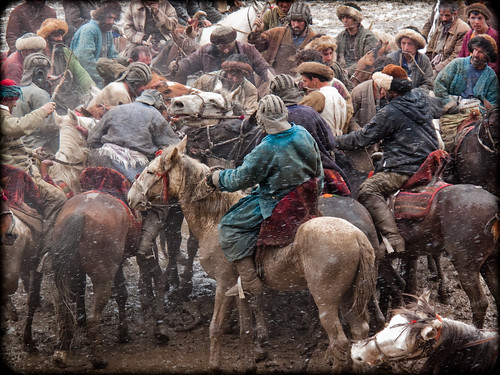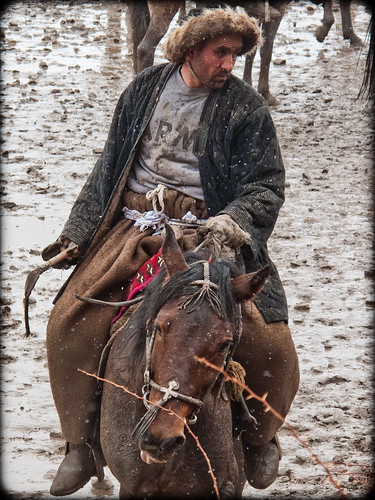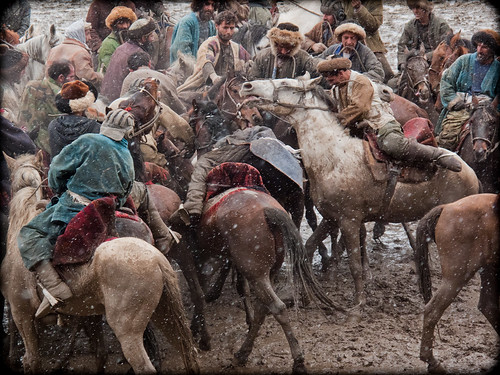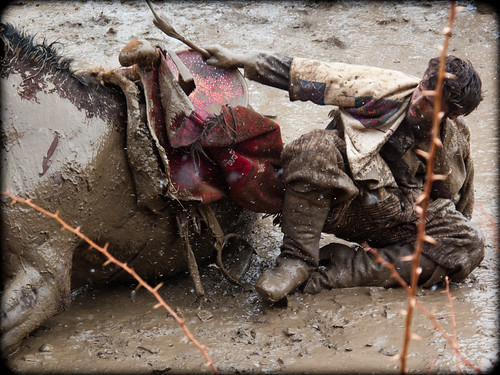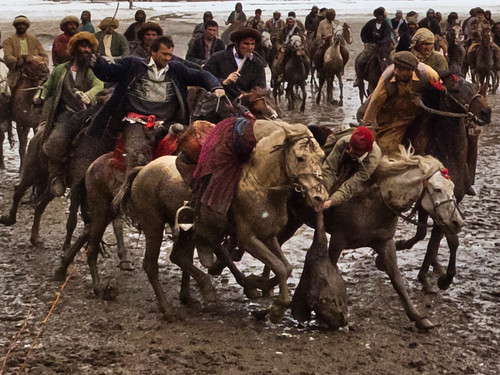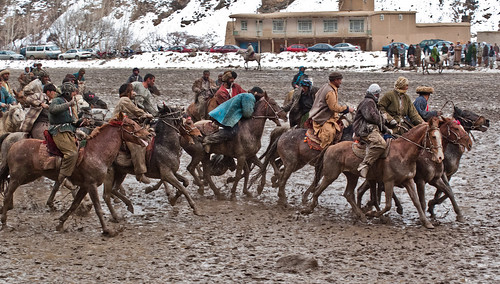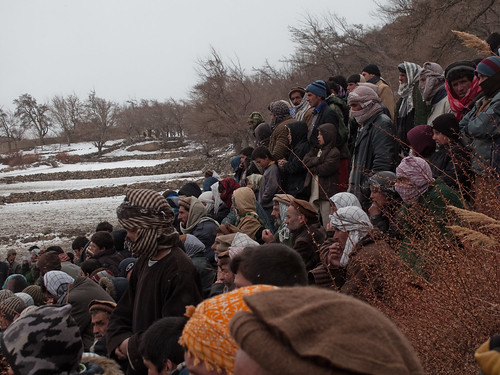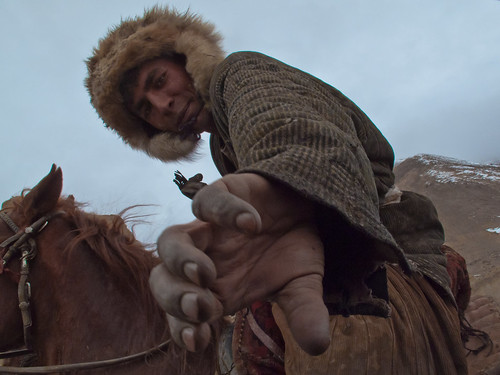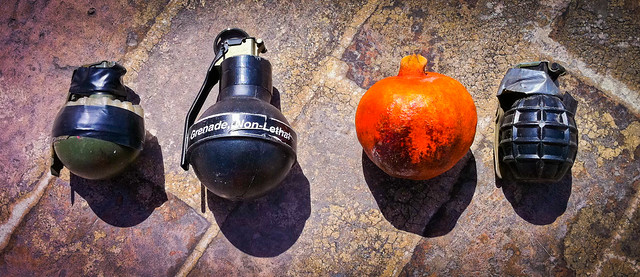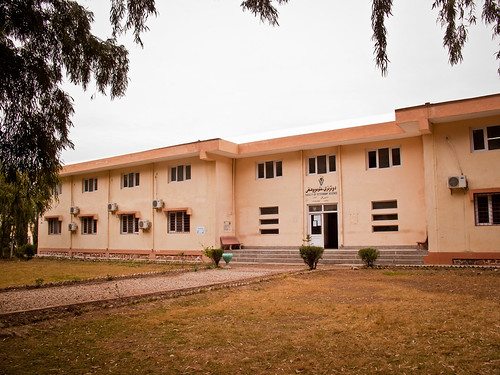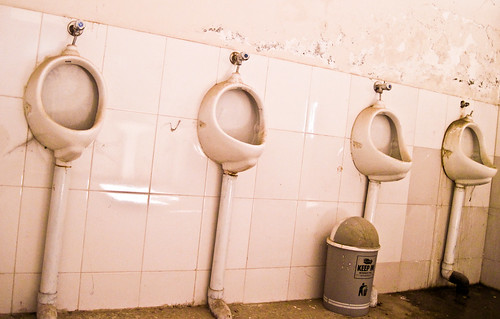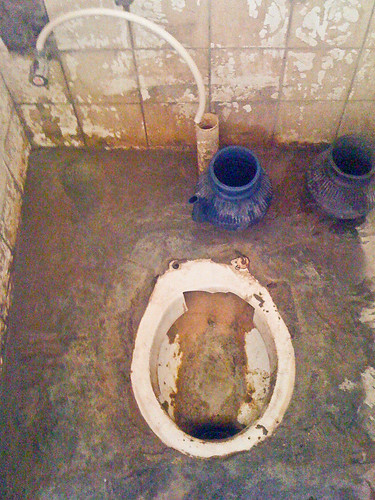Entering the FOB
If you search for Jalalabad on googlemaps only one road shows up, Hwy A01, the Asian Highway, a.k.a. Kabul-Jalalabad-Torkham Highway. Â That road is the main drag of Jalalabad City, sporting twoish lanes of traffic flowing each direction, packed with tuktuks, motorbikes, donkeys, tracktors and toyota corollas, all jamming for space.
The main US army base in our region is FOB Fenty, located on the eastern edge of Jalalabad City. It’s a well-established base that’s been around for many years.  It’s main gate directly opens onto the Highway.  Part of the security protocol for handling entrances and exits to the base requires clearing the road in both directions for about 100 feet to prevent any opportunistic assaults. This tends to make for interesting traffic jams:
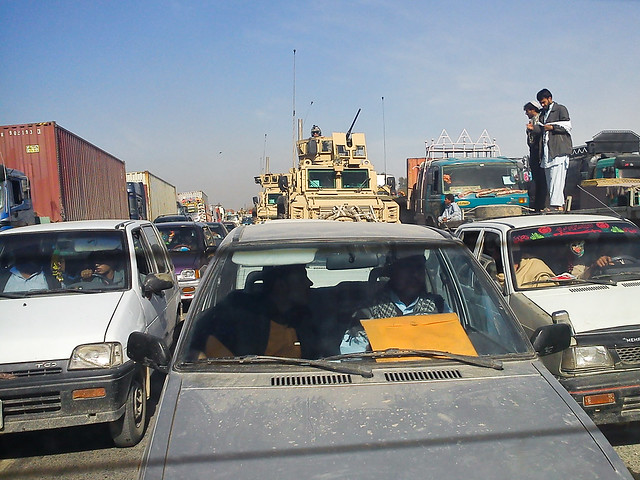
The main gate to the base is a 20 foot wide steel door with a large guard post on one side. Parked behind the steel door is an MRAP to further block the door should any one attempt to smash through it.
If any vehicle, including MRAPs, ANA pick up trucks, supply convoys, or personal cars pull up to the gate to enter the base, protocol requires that the area around the gate must be secure before it can be opened. This entails a dozen fully armed soldiers dispersing into the road and stopping traffic 100 feet back from the gate going both directions. Only once all the traffic on the main road in Jalalabad has been ground to a halt, can the security MRAP be backed up to allow the gate to open, and the vehicle to enter. Once the vehicle is safety in, the gate is closed, Â the MRAP has been driven back into place, then traffic can start flowing again.
Imagine if a highway you drove between home and work was intermittently blocked in both directions by guys cursing at you in a foreign language, “stop,  stay the fuck back” while pointing rifles in your face and occasionally firing warning shots.
How is this set up supposed to win the “hearts and minds†of the Afghan people?
The security procedures make sense as the base is often a target of attacks, but after years of this mayhem maybe the army should think about moving this heavily trafficked, highly secure entryway onto a side street, perhaps off the major highway running through town.
To lose and find a child in Afghanistan …
Rawed’s father Gulzada brought him to Jalalabad city to be seen by a doctor.  Seven year old Rawed was showing symptoms of jaundice.  They drove into the city from a small village in the district of Sherzad.  As is common practice, dad temporarily left Rawed with a shopkeeper from the same village and went to park the car.  “I’ll be back in a few minutes, and then we’ll walk to the hospital.”  When he returned the child was gone.
Gulzada is our friend Haji Najib’s ma’ma’, which means maternal uncle. Â A paternal uncle is called ka’ka’.
The shopkeeper insisted, “he was just here.” When thirty minutes passed and the boy was still missing, dad called Najib.
Ma’ma: “What would you do if you lost a child in Jalalabad?”
Haji: “I’d make sure not to lose the child, and if I did …”
Ma’ma’: “I lost my son.”
Haji: “I’m on my way.”
Haji, which is how everyone calls Najib, always seems to be dealing with emergencies and he’s good at it.  We call him in like a storm trooper and he comes through. After he got this call, we lost him for two days.
So what do you do if you lose a child in Afghanistan?
Haji, Ma’ma’ and Ka’Ka’s son rented a loudspeaker, mounted it on the car, and started cruising an increasing perimeter around the site the boy was last seen.  They brought Ka’ka’s son along because he has a memorable cellphone number.  They figured this was important if you were going to be shouting it out in passing.
“Dear fellow Muslims, we have lost a 7 year old child around 9am. Â He was wearing grey clothing and white shoes. Â If you have any information, please call 077 77 20 900.”
They kept repeating this fruitlessly until 3pm.  And then a 15 year old boy who sells phone cards in a road side shack ran up to the car.
“I’ve seen your son.  He was with me until 11:30am.  He was crying and I tried to calm him.  I bought him an orange.  He refused.  I bought an apple.  He refused.  He kept saying my home is there and pointed at the horison.  ‘I want to go back home to Sherzad.’ ”
The 15 year old found a 10 year old who was from the same district.  As it later turned out, that was a fortuitous move.  The 10 year old was a relative.  But neither the 10 year old or Rawed knew their relation.
The 10 year old was instructed to bring Rawed home.  Surely, someone from Sherzad should take care of a missing child from Sherzad. Unfortunately, Rawed did not cooperate.  He kept crying and just minutes later refused to go any further.  “I want my dad.”
As it happens in fairy tales, three tweleve year old boys chanced upon Rawed and his 10 year old companion.  They inquired, deliberated, and decided that they should take Rawed.
They did the sensible thing.  They first took him to the nearest Mosque and having announced the case and consulted with the Mullah, they decided to start scanning their own perimiter, on foot, announcing:
“Dear Muslims, we have a lost child. Â Here he is. Â Look at him. He is from the village of Shirzad. Â Help us find his parents.”
And they walked like this for many hours.  Even Haji Najib heard about them from people who walked up to his car with the loudspeaker.  The twelve year old boys tried diligently.  After many hours, when the
sun was near to setting, at 5pm, they met a 25 year old man in a car. Â He was also from the same village and offered to help the boys out. Â He would take Rawed and help him find his father.
By this point, the loudspeaker broke twice and Haji Najib and crew had both times replaced it.  They also requested an announcement to be broadcast on three radio stations at 11 am.   They wore our their voices, taking turns, until 10pm.
At this point, activity stopped on the street, and Haji, Rawed’s dad, and all of the male members of the family present in Jalalabad gathered around the dinner table and made their plans for the following day.
They decided to break up into teams.  At this point, they heard about the 12 year old boys and the fact that they connected with a local Mosque.  They figured, one team will canvas the schools and one the Mosques.  Surely, they would find him.  A third team, lead by Haji, would contine enlaging the perimeter with the loudspeaker.  If neither party found the boy by 4pm, they would make an announcement on television.
After a sleepless night, they set out at 6am.  They had no success.  Haji started to get phone calls from a man claiming to have found the child.
“Consider as if he is with his mother and father.  If you pay money, you have nothing to worry about.”
The phone calls persisted.  The sums requested were small, maybe 10$ worth of phone credit, but the caller refused to allow contact with the child.
It is not uncommon (in Afghanistan as elsewhere) for people to opportunistically prey on other people’s vulnerabilities. Haji’s phone number had been announced on the radio, so the caller could just be a prank. Nevertheless, it was the one active lead, so Haji started taping his conversations, dragging them out and trying to extract as much information as possible.
At 4:30pm they delivered a photo from Gulzada’s phone camera to a local television station, RTA (Radio Television Afghanistan).  Then they resumed driving around with the loudspeaker.
Hameed joined the crew at 5pm and took over the announcements with a fresh voice.  At 7pm of the second day, the loudspeaker broke for the third and final time.  It was too late for repairs or a replacement.  And they were worn out.
They returned home for sustainance and an all hands meeting.  After dinner and tea, the search party, which by then had grown to 10 people, crashed out in Haji’s family’s living room.
At 9pm, the elder of the house (a law professor at Ariana University who had studied in Bulgaria) roused them with news that Rawed’s face had just been shown on RTA television.  And at 9:45pm Haji got a call from another number, saying that they had the kid.
It turns out, that the 25 year old brought Rawed home as promised. His father, a big merchent in town, handed the boy to one of his employees for care.  This way Rawed spent the second day in the village of Baze ik Malati (where Baze refers to its proximity to the American base at JAF, Jalalabad Airforce Base).
On the phone they agreed to meet at a public square called Chowk Muhbrat.  The merchant and his 25 year old son came alone. When they confirmed the identity of the child with a photo, they agreed to exchange Rawed at the police station.
The merchant drove with Haji, while his 25 year old son went to fetch Rawed.
At the station, Haji ran up to hug Rawed, but Rawed looked startled as if he hadn’t recognized his cousin, and started to cry for his father. I’m not sure why they didn’t bring his father in the first place, but at this point, they sent a car for him.
In his fathers arms, Rawed cried and laughed.  The identification was complete and the celebration started. One of Haji’s uncles gave 2000 Afs to the merchant as a finder’s fee and another 500 to his 25 year old son. Another uncle gave 2000 Pakistani Rupees to the 25 year old.  The police asked for some too, saying they also wanted to celebrate.  So they gave 500 Rupees to one officer and another 500 to the clerk who filled out the paperwork.
They also picked up oranges and apples and handed them out to everyone. The following day Rawed and Gulzada went back to their village carrying a load of fruits, tea and sugar from the big city, expecting to host lots of relatives in the village who were aware of the situation and understandably concerned. They did not stop to visit the doctor in Jalalabad.  Another one of Haji’s uncles is a Tajikistan educated doctor that lives in Sherzad and runs a pharmacy, so they decided to bring the boy to him.
In the final tally, Rawed had changed hands from his father, the shopkeeper, the 15 year old, the tweleve year olds, checked in at a local Mosque, the 25 year old, his merchant father, spent the night at the merchant’s employee’s house and was finally reunited with family at the police station.
The search party (which grew to ten people and involved many others) lasted for two days and spent a few hundred dollars on loudspeaker rental, repairs and replacements, gas, photo reproductions, food and fruits.
In the end, they found Rawed.
Najib called the original caller back another time.  He asked whether he still had the child.  The guy claimed he had.  How did you get him?  Najib asked.  “An Army commander gave him to me.”  Najib cursed him out.  Either this was all a ploy, or another child is still out there, kidnapped.
Buzkashi
On a down day in Kabul, we decided to take a road trip up to Panjshir Valley. Lou has written about our experiences in a previous post. This post focuses on the game of Buzkashi.
The objective of Buzkashi is to gain possession of a goat carcass, carry it a full loop around the field, and then deposit it into your opponents goal (which is a circle on the ground). If at any time you drop the goat, you have to restart the loop again.  There are referees who determine whether the goat has been deposited in the goal correctly. Here’s a frame of the players looking for the call from the ref.
Losing possession means you either dropped the goat or someone yanked it out of you, like a fumble in American football. Here you see the dead goat on the ground among the pile of horses. Now one of the players has to lean down off his horse (without dismounting and pick up the ~100lb carcass).  That is a dangerous proposition. Hopefully your friends have blocked out your opponents well, before you try. Otherwise you will get trampled.
Mark the Soviet Tanker helmets many of the players are wearing in this
I asked them where they got the helmets. They said it was form the Soviet Tankers they killed. Up and down the valley, there are hundreds of scattered tanks. Four helmets per tank. I believe them. Nowadays, some wear American Army gear.
The rider in the center is trying to reach down and grab the goat.
Mud soaked from falling.
This rider got up and rode again. It is a brutal sport. You show your mettle to your fellow villagers.
Sometimes it takes four hands to brag the goat.
Here you can see a formation. The three on the right are like the linebackers. Then one behind them is ready to block out another team. And the two behind him are sharing the load of carrying the goat.
Taking photos from the crowd. And now turning the camera at the crowd.
On the way back home, our car shared the road with Buzkashi riders on horses. This one tried to grab my camera. Instead, I got a shot and then reached out and shook his hand.
Now see it all in action (thanks Lou!):
Etymological Weaponry
Two representative symbols of Afghanistan, grenades and pomegranates, come from the same etymological root. We discovered yesterday that the word “grenade” is taken from the French “pome-grenate.” French soldiers gave the handheld explosives their name because they looked like the seeded fruits, both in their round shape topped with a crown, and in their inner workings consisting of lots of small seeds, prepped for activation.  We keep a stock of both at the Taj.
Meanwhile, “RPG” is usually miss-translated as “rocket propelled grenade.” Its a memorable term that fits the letters and sounds like it could be right, but isn’t. Here the Soviets can claim origin as the letters actually originate from ручной противотанковый гранатомёт, meaning “hand-held, anti-tank, grenade launcher.” It’s not quite as catchy in English because “HHATGL” doesn’t have the same ring as “RPG”, so we’ve adopted the acronym while making up a handy substitute for the letters. Plus, “rocket propelled” sounds bad ass.
Urinals in Afghanistan
When construction does happen at Nangarhar University, it usually takes place in the summer months when the students and faculty are on vacation and there is less interference with classes and all that. Upon returning to campus, there is a buzz of surprise among the students with each new building.
This is the veterinary building in Nangarhar University. The funds for its construction were provided by USAID and its blueprint followed a standard mold for such a building, designed in the west and probably never intended for Afghanistan.
A local construction company was hired and contracted to build according to the provided specifications. Since the design of the building specified urinals in the bathrooms, the local construction company built them.
In Islam it is prohibited to urinate while standing. Prophet Mohammad “pbuh” always squatted when he urinated and we do everything the same as he did. Â The term for following his practices and customs is “Sunnat”. So five years after the construction of these urinals, they remain as clean as all the other urinals I have seen in Afghanistan (and the only ones I’m aware of in Nangarhar Province.)
A few years ago, a similar construction mishap occurred. Another foreign company designed the dorms at NU and incorporated Western toilets. The students in the dorms soon destroyed all of the toilets because they happened to be facing Mecca.
According to Islam, even when seated, you are not allowed to urinate in the direction of Mecca.
The plumbing hole in the ground is all that remains from those toilets, and that is where we do our business. With a symmetric round hole, it’s up to you which direction to swivel.
In my opinion, to avoid such misunderstandings and others like these, foreigners who work in Afghanistan could consult with their Afghan colleagues in the process of implementing any development projects, and give their contractors flexibility to push back on cultural issues.



